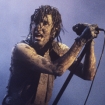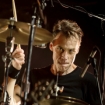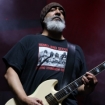"There were periods where people were quite critical of us," Chris Cornell recalled, one rainy morning in September 2012. "The indie scene was always critical of me, from the very beginning, because it was back when the word 'alternative' was based on its actual definition, and the biggest-selling commercial music of the time was hard rock. I think it appeared to a lot of people that I could have existed in that world, so why am I bothering the post-punk indie people with my presence, if I can actually sing and come up with melodies? It was like, 'Go be in a big, famous arena rock band!'"
We'd met for breakfast at the Beverly Hills Hotel to discuss the making of King Animal, Soundgarden's first new studio album since 1996's Down on the Upside, but talk naturally turned to the band's early days on the Seattle scene. And while he had no way of knowing it at the time (at least until I sheepishly admitted it to him), Cornell was looking across the table at one of those people who'd been deeply critical of him, way back in the day.
I'd first become aware of Soundgarden in 1987, upon the release of their Screaming Life EP, but didn't really start paying attention to them until the following year, when Ultramega OK, their first full-length album, landed on the playlist at my college radio station. Like most of the DJs at the station, I was completely smitten with the vibrant, visceral sounds coming out of the Pacific Northwest at the time — records by Screaming Trees, Mudhoney, Melvins and a little band called Nirvana, who had just released their first single. The music was raw, aggressive and thrillingly antithetical to the neutered and overly-polished product that was then passing for mainstream rock.
But while Soundgarden was clearly part of that same scene — and were obviously mining the same Stooges and Black Sabbath records for inspiration as their Seattle counterparts — there was something markedly different about them. Soundgarden's brand of heaviness was more musically complex than anything then coming out of what would soon be dubbed the "grunge" movement … and they had a freak of nature named Chris Cornell on vocals, who sounded like Robert Plant jacked up on jet fuel, and looked like a Greek god in camo cut-offs.
These attributes, to say the least, did not exactly compute for listeners (like myself) who thought indie rock should be punk-influenced, "real"-sounding (e.g. raw and sloppy) and ugly. Tricky time signatures and an impossibly handsome, usually shirtless frontman with devastating pipes? This was total "rock star" territory — and there was nothing less cool in 1988 than someone trying to be a rock star. Who the hell did these guys think they were, anyway?
Like many initial Soundgarden skeptics, I changed my tune after seeing them live. In person, they came off as down-to-earth as any of their Seattle compatriots, shambling onstage in the same tour-stained clothes they'd been wearing when they pulled up to the venue, and making smart-ass jokes between songs. ("We're the Village People," Cornell announced during the first Soundgarden show I ever saw, "and I'm the football player." "No, man," guitarist Kim Thayil shot back, "That's the All-Sports Band!") Their psychedelic influences, which had been kind of buried under the crappy production on Ultramega OK, came intriguingly to the fore in a live setting, which lent a fascinating dimension to their sound — even if their early audiences weren't always ready for that particular aspect, either.
"The 'punk-rock Bible' group hadn't really accepted that notion yet," he laughed, when I mentioned Soundgarden's psychedelic tendencies. "It was like, 'No, wait a minute, you can't do that!' I remember Soundgarden playing an early gig in Vancouver, and Mike Bordin of Faith No More was there; he was a big early supporter. And I remember an ashtray, a big chunky glass ashtray, whizzing right past my temple. The audience was all completely back against the wall and seated. They just hated us. At that moment, I felt like, 'Oh ... we know something that they don't!' Every time we got that reaction — and we got it a few more times after that — I felt like, 'We're doing something that they don't know what to do with.' It's not that it's bad, because that's not how people react to bad. It's something else. You're talking to your buddy if it's a bad band playing. You're ordering another drink and ignoring it. You're not standing there looking at it, trying to figure out if you should kill them or like them."
It's true — from their early days all the way up until Cornell's shocking death on May 18th last year, you simply couldn't take your eyes off Soundgarden whenever they were onstage. And a good percentage of their power to transfix was due to the grunge Adonis at the microphone, a man with the talent, looks and charisma of a born rock star.
And yet, there was also a sense of wariness and detachment palpable behind Cornell's striking visage. Though he never held anything back from his music, he always seemed to distrust everything that came with success — the fame, the adulation, the money, the press. "We went from the top of the indie heap to being thrown into the heavy-metal world," he told Revolver in 2006, looking back at the success of 1990's Louder Than Love, their first album for major label A&M. "And the word embarrassing came up a lot. Suddenly we had to deal with this existential dilemma: I'm looking at a picture of my band in this magazine, but when I turn the page it's Poison. What does that mean?"
Music had been Cornell's primary source of refuge during his lonely and troubled teenage years, but he hadn't figured on making a career out of it, let alone on spending his life in the spotlight. "I did a lot of listening to music alone," he told me. "That's sort of how I became a musician, just based on years and years of being a super-geeky music fan. I didn't really think of being in a band or making records or writing songs until I was probably 17, 18 ... I wrote songs and stuff, but I didn't think that was what I was going to do until I was in my late teens. Listening to an album was definitely like a really important escapist thing that I completely dove into."
Cornell waxed nostalgic during our interview about buying albums from his neighborhood head shop, and how all of the albums he purchased there would smell like the store's perpetually-burning incense for ages after he brought them home, something which only added to their mystique. His tastes initially ran to classic rock — Beatles, Pink Floyd, Led Zeppelin — but he was adventurous enough to buy albums by artists he'd never heard of, often based solely on their artwork. "The first Bauhaus record I bought was a live record [Press the Eject and Give Me the Tape]," he remembered. "Peter Murphy's hiding his face behind a cymbal — which is removed from the drum kit, which I liked — and he's singing. Something about that just spoke to me, like, 'I don't know what this is, but this has to be great.' They became one of my favorite bands."
Cornell tapped into that same spirit of curiosity and adventurousness throughout his envelope-pushing career. He wrote "Black Hole Sun," the single from 1994's Superunknown that remains arguably the band's most famous song, in a 15-minute burst of inspiration, and brought it to the band despite reservations that it might not be "Soundgarden-y" enough. "'Black Hole Sun' was a big 'outside' moment," he told me. "Everyone liked the song, but none of us, including me, were sure that that should be on a Soundgarden album. And then we just recorded it, and it seemed to fit really well within the context of the rest of the album. But none of us ever thought it would be a single. That didn't make any sense."
While he could have easily coasted on his voice and looks, Cornell was also a consummate craftsman when it came to songwriting. When I interviewed his bandmates Kim Thayil, Matt Cameron and Ben Shepherd around the release of King Animal, all three of them raved about the creativity and musicianship of his demos for the album. "Trying to play Chris Cornell bass lines is insane," marveled Shepherd. "He always says, 'I'm just trying to play how you would play!' Oh my god, he's a way better bass player than I am, so learning his lines is tricky, because he understands syncopation and melody so good. His lines are always really fun, man — really tasty and really powerful."
Raves and plaudits didn't always follow Cornell's non-Soundgarden musical adventures, however. While Soundgarden fans generally embraced his hard-rocking collaborations with Temple of the Dog and Audioslave, his solo albums occasionally had them scratching their heads, and in some cases — like Scream, his 2009 electronic pop collaboration with noted rap/R&B producer Timbaland — left them foaming with rage. "Fifty percent of my career is doing things that upset a certain group of fans," he laughed during our conversation. "So I don't want to neglect that side, either — I'm working on the next thing that's gonna really piss people off!"
That "next thing," 2015's Brendan O'Brien-produced Higher Truth, was a mellow and intimate affair. It sounded at the time of its release like the work of a man who had faced down his demons and was grateful to have lived to tell the tale; though in retrospect, it seems clear that said demons were only laying low for the time being. "The Promise," an orchestrated ballad Cornell wrote and recorded for Terry George's 2016 film of the same name, was released as a single two months before his death. But for many fans, Soundgarden's King Animal serves as his ultimate epitaph, a final shining recorded example of what Cornell described as "this unmanageable, chaotic thing" that magically occurred whenever he and his bandmates joined forces.
"I used to think about it a lot," he told me. "Even on our last tour of Australia [before the band initially broke up in 1997], we were having some of the best shows of our career, and some of the worst! And I was trying to figure out why, and it kind of came down to this indescribable chaotic element that's there. If there's too much of it, it's a disaster, and if there's none of it, it's a disaster. There has to be a certain amount of it, but it doesn't seem to be controllable, which is scary. So what do you do? Do you just go out there and hope that that element is there in an adequate amount to make it great?" He laughed. "That came right back, and I had not heard that since we split up, and I'd never had that experience with any other people."
That indescribable chaotic element was certainly in full effect during the band's final show on the night of May 17th, 2017, and perhaps it followed him back to the hotel that night. While we may not ever know the full truth surrounding Cornell's unfortunate demise, there's no question that his impressive musical legacy will continue to excite, intrigue and inspire.
"I think [Soundgarden has] always been a little too diverse to figure out easily," he told me. "And that can be a problem, possibly now more than ever, because people digest things very quickly and then are distracted by the next thing. I think it's helped our longevity, and I think it will help our longevity after we drop dead, but I also think it was a minus when it came to popularity in the big picture, and selling a lot of records, and existing in the major label world that way. We still have the elements of indie post-punk that was kind of anchoring us, and keeping us from being an easily understandable and accessible commercial rock band. Which we never were. We had our moments, but we were also very difficult, if not impossible, to mimic with any success," he laughed.
"I've always summed all that up as good for us — like, how lucky are we that we can sort of maintain that? Some of the weirdness and versatility, which is super exciting when it's your band and that's what you get to do … and yet, to still have enough success that we can continue to make records as long as we want, and we can all have careers separately, and we can all go out on the street or go to a hockey game and not get harassed. And that's pretty awesome! I think it's good for us to sort of pause occasionally and realize how lucky we are to have that balance that we created."
And how lucky we were to have them — and him — period. Rest in peace, Chris.
If you are experiencing suicidal thoughts, contact the National Suicide Prevention Lifeline at 1-800-273-8255 (TALK) or go to SpeakingOfSuicide.com/resources for a list of resources.












